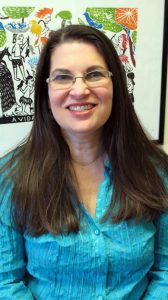 Katia Almeida delights in how her students represent various majors and interests—medicine, business, engineering, the arts and more.
Katia Almeida delights in how her students represent various majors and interests—medicine, business, engineering, the arts and more.
Because, she believes, the study of anthropology is relevant and applicable, no matter the discipline.
“It enables you to see the world from a different perspective,” said Almeida, who grew up in Rio de Janeiro, Brazil, where she earned a master’s in history and a PhD in anthropology.
She teaches undergraduate- and graduate-level courses in cultural anthropology, globalization and socio-economic development, contemporary Latin America and Brazil and SAGES seminars.
This year marks Almeida’s 20th year of teaching, and her 11th at Case Western Reserve University without ever taking a semester off. Such passion and commitment to education earned her a 2014 Carl F. Wittke Award for Excellence in Undergraduate Teaching.
Almeida engages students by weaving into her lessons personal and research experiences. She also incorporates news articles and audiovisual materials to demonstrate anthropology’s relevance for critical thinking and cross-cultural analysis.
Almeida’s research experience spans from the study of visual culture and gender in the Amazon to the investigation of the impact of electronic technologies on contemporary youth cultures. She is currently investigating globalization and high education.
“She is a very dedicated teacher, and that is clearly seen by students,” said Lawrence Greksa, chair of Department of Anthropology. “I’ve spoken with many who have told me that they became interested in anthropology and, ultimately, [chose to] major in the subject after they took her Anthropology 102 class.”
Almeida, whose knowledge of social sciences, arts and humanities, multicultural and multilingual skills and strong interest in world affairs shape her approach to teaching, makes a point to really get to know her students. No matter how many classes or students she is teaching, she learns each student’s name, interests and majors, and tries to have at least one conversation with each of them during the semester.
“I place strong emphasis on creating a welcoming, friendly and respectful learning classroom environment and strive to foster interest and intellectual engagement,” she said.
As one student nominator wrote: “She is professional with students and wants to see them succeed in the academic standing, but she also is personal and caring. She has a heart of gold that she shares through her Brazilian culture and her earnest desire to equip students to face the world.”
“What I love the most about teaching is the face-to-face interaction with students inside and outside the classroom,” Almeida said. “I enjoy seeing how anthropology changes their perspective about the world and about themselves, creating a broader and deeper cross-cultural understanding, on one hand, and a more tolerant attitude on the other.”
The Wittke Award, established in 1971, honors Carl Wittke, a former faculty member, dean and vice president of Western Reserve University. Each year, two Case Western Reserve faculty members receive the award for their excellence in undergraduate teaching. Almeida shares the honor this year with SAGES teaching fellow Lisa Nielson.

